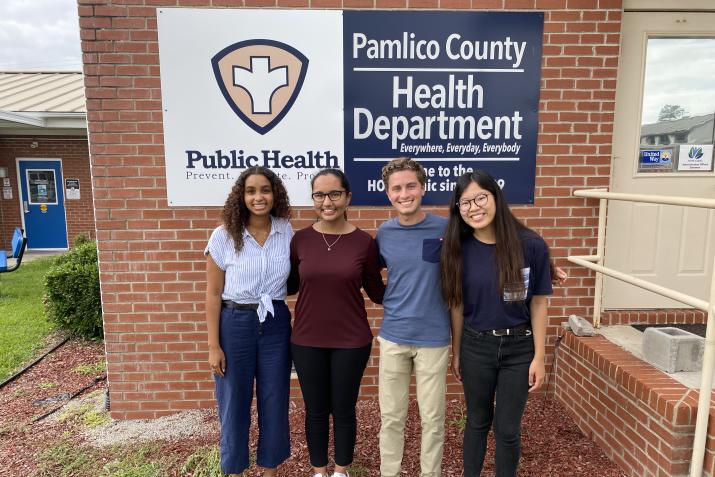SRT - Pamlico County (2023)

Application Deadline:
Project Status:
-
Filled
Faculty:
Topics:
- Health care access,
- Digital health,
- Non-communicable diseases
Countries:
- United States
Locations:
- Pamlico County, North Carolina
Start Date:
End Date:
Project Type:
- Student Research Training Program
Pre-Approved:
-
Yes
Placements Available:
-
4
SRT - Pamlico County (2023)
Pamlico County (PC) is a beautiful rural, coastal county with about 13,000 residents, a high rate of chronic diseases, many elderly and a significant proportion living in poverty. It is also prone to hurricanes and flooding, making disaster readiness and response critical. The County has a limited primary healthcare system of 3 clinics but no hospital.
During the last two academic years, a Bass team, a GH Capstone team, and a SRT team worked very successfully with a variety of county partners, including a local charitable clinic, the PC Health Department, and the Pamlico County Disaster Response Coalition (PCDRC), resulting in the community’s desire to continue developing a longer-term University-County partnership addressing local rural health care needs, access, and systems development.
Students will work closely with county leaders to implement new work streams, continue strengthening relationships with current partners developed thus far, and expand to new partner clinics, NGOs, and possible neighboring county organizations. For examples of SRT 1 Summer 2021 work, read this news story.
Areas of student research might include but are not limited to:
- Identification and documentation of disparities in health status, outcomes, and access to care within the rural population. Investigate the ‘hidden diversity’ often present in rural communities and its implications for strengths and inequities
- Evaluation of Mobile outreach services, including examinig use of CHWs and integrating other health worker streams such as nurses from the DSON.
- Integrated care, including counseling and mental health services
- Exploration and improvement in EMR systems, including through the development of a care-net model encompassing fuller set of providers to expand coverage
- Use of frugal innovations, digital technology and innovative apps for chronic disease management
- Examining how rural counties can create an aligned, multi-county coalition to have a larger presence with policy makers and attract more resources than their individual, small populations can do
- How emergency management and public health can be integrated in disaster readiness and response
- Building on the care gap results SRT1 completed, investigate populations that may be lost-to-care as well as those not being served currently by local health care options.
The team will work closely with Faculty leads, SRT1, and county partners over Spring semester. There will also be opportunities for the team to engage in clinical shadowing, assisting with the identification and development of grant proposals, and volunteering in county health tasks and fairs.
We are looking for students with:
- Desire and dedication to address inequities and disparities in rural healthcare
- Interest in alternative delivery models of care, especially for chronic care and seniors
- Interest in applying frugal and digital innovation in a rural community
- Interest in health policy and developing models that support capacity building and sustainable transfer of implementation to local leadership.
- Knowledge (course or experience) in research methods, data collection and statistical analysis helpful
- Ability to work virtually, but when opportunity presents, to travel to Pamlico and meet the community partners and local residents
- Open to diverse cultural perspectives and working with people across a spectrum of ages, educational backgrounds, races and religious beliefs
- Self-motivated learner, excellent project management, organizational, team-work and communication skills
- High Professionalism and cultural respect and sensitivity in working with community co-workers and leaders, health workers, and NGO supervisors.
Prior experience with any community-based organizations, community-based care delivery, community surveys, qualitative focus groups or key informant interviews, as well as experience with digital innovations in health care delivery - a PLUS!
PROJECT APPLICATION PROCESS
Students must fill out and submit a project application, CV and recent transcript to GH-Education@duke.edu by October 14, 2022 at 5pm ET. Applications open September 29. Students may apply to no more than two project opportunities and a separate application must be completed for each SRT project site. Program interviews are scheduled to take place between October 31 and November 9. Any questions regarding the application, interview dates or general project information should be directed to Lysa MacKeen.
Last updated on July 23, 2024